Heading out the door? Read this article on the new Outside+ app available now on iOS devices for members! Download the app.
My wife laughed so hard I worried she would split her cheeks.
It was late May 2024, and I was due on a flight to British Columbia in less than 24 hours. Several months earlier, I’d accepted an invitation to Mountain Trek, a so-called hiking retreat on the shores of Kootenay Lake, a skinny but distended strip of blue water suspended between the Purcell and Selkirk mountains near the province’s southern edge. I thought I understood the ask: I would hike and hang with retirees who had spent 9,000 Canadian dollars (or about $7,000 in the States) for a week of guided walks and nights passed lounging fireside at some presumably palatial resort, where chocolate fountains flowed within easy reach of a big-screen television. Hell yes I was in.
But Tina was now doing the due diligence I had neglected, reading Mountain Trek’s list of expectations and operating procedures. For her, the findings were hilarious; for me, they rapidly became terrifying. “Did you know,” she said, face red and catching her breath from a full-body quake, “that you can’t have ice cream for a week? Or any sweets? You’re going to lose your mind. Oh, no caffeine, either.”
I was, to put it mildly, in a phase. Five months earlier, we’d completed the Triple Crown of Hiking by walking from the northern border with Canada across this country’s Rocky spine to the southern border with Mexico. My celebratory splurge had lingered, such that ice cream was becoming this sober man’s drug, a near-nightly indulgence that had worked its way into my wind-down ritual. Maybe I was depressed, having finished such a monumental task? So as Tina ticked off Mountain Trek’s continuing list of contraband, including not only ice cream and caffeine but also the Internet and most screens of any sort, I squirmed and groaned. Just how much was I going to hate this thing?
A little more than a week later, on the evening of my 41st birthday, I stood on the rocky shores of Kootenay Lake with a half-dozen strangers I now called friends. On the count of three, we all waded into the 53-degree water, laughing through a self-made competition to see who would last the longest. For each of the last seven days, I’d gone on mid-length hikes with these people, now pals who dropped big rocks in my borrowed Mountain Trek backpack so that I’d move at their speed.
We’d done morning yoga together, sat in steam baths and saunas and had hard conversations, prodded one another awake during lectures about metabolism and mental health, and sometimes chuckled about the New Age conundrum of choosing between a nighttime sound bath or a reiki session. We’d also shared all of our meals, each plotted to curb the number of calories but to boost the nutritional payload. Aside from a surprise saucer of chocolate mousse for my birthday, I had not had dessert in a week. Sweetness had become the carrot with the lunchtime hummus, the fruit glaze atop the muesli.
And to be honest, I’d rarely felt better. It was as if tending to your health every day and letting the world around you slow to something resembling a manageable pace was, well, good for you. I could feel the lightness of my brain and body, and, more important, I could spot it in the people who had begun the week at the end of some rope I could not see—the overworked Silicon Valley tech employee who had arrived in a huff but suddenly seemed to be beaming, the retired flight attendant who had struggled to sleep for years but now seemed hopeful about some new techniques, the young couple who had left their small kids and small business back in Edmonton and seemed to be learning to breathe in one another’s presence again. None of us were different people; we were just brighter, more balanced, better.
I turned 42 a few weeks ago, and I’ve thought about that blessed Mountain Trek stint every day in the year since I left. And I have increasingly thought about the unfair luxury of it all, about how the odds that most people will ever have an extra $9,000 to spend on their health (elective or otherwise) are only getting smaller. We continue to build a world where most of us will never have the resources to take care of ourselves that way.
I didn’t pay to go to Mountain Trek, because I was invited. Would I pay that much to change my life in the way Mountain Trek certainly did? My answer, I imagine, is the same as most Americans in 2025: If I could, hell yes I would.
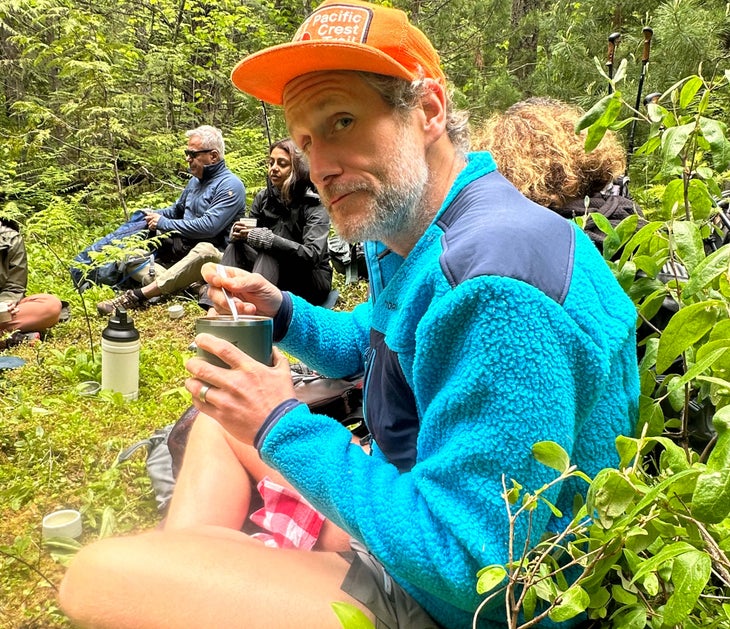
Health retreats are not, of course, a novel concept. They have existed for as long as humans have thought we might find solutions to our problems by going somewhere—to the beach, to the mountains, to a spring of hot water. In France, thermalism, or the act of improving your health by getting in thermal springs, has been so important for so long that “social thermalism” guaranteed citizens access to such salubrious waters beginning in 1947; 90 municipalities now have “thermal resorts.” Tuberculosis resorts, like the Stanley Hotel in Colorado and Castle Hot Springs in Arizona, were long used to manage that deadly disease’s symptoms.
We are interested, it seems, in such possibilities yet again. After the first year of the pandemic, when people’s worst habits festered inside their homes, there was an explosion in wellness travel, with one survey finding that 76 percent of people wanted to go on vacations that improved their health. “What we’re seeing, certainly in hospitality, is the need to serve really the whole person,” one resort employee told The New York Times’ Concepción de León. Our malaise was ourselves, and we needed a break.
My idea of a health retreat, though, was radically different: Rather than escaping somewhere exotic, I would disappear into the woods for a month or six, thru-hiking some trail for several thousand miles of limited cell phone service, scant grocery options, and negligible creature comforts. After the second such trip, I began to depend on this reset of my baseline, of my understanding of the things that life should offer or make easy.
I had, however, picked up some bad habits along the way, like beating my body until it barely worked, perhaps binging on booze in too many towns, and the aforementioned ice cream indulgence. When I first heard about Mountain Trek, then, I understood it to be slower hiking with older people, sans booze but with high-quality food. It was, in effect, the opposite of thru-hiking. That’s why I accepted the invitation, to try a vastly different approach to an activity that had already changed my life.
What I found, instead, was something that I didn’t know existed: an opportunity to dismantle and examine every system in my life and figure out what was distracting, disorienting, or even breaking me. We think so much now about optimization, about using external tools to improve what we can accomplish. What is our fascination with AI, after all, aside from an enthusiasm for all the things we suppose we can’t do ourselves, at least so quickly? Mountain Trek offered the opposite approach—what’s preventing you from doing what you can actually do?
It began with the bedroom. Given the cost and clientele, I expected the quarters to be plush, all silk sheets and in-room Jacuzzis. Instead, the rooms were almost laughably modest, with a full bed tucked into a yellow-walled corner near a chest of drawers and an old high-back chair so uncomfortable the last thing I wanted to do was sit in it. There was a small shower in a diminutive bathroom. There was no television and a bedside reading lamp so puny it seemed to be a dare: Read here, and lose your eyesight. The whole thing appeared to be decorated by a grandmother who didn’t really care if I stayed or went. And that was entirely the point, to goad us all out of our rooms and into anything else Mountain Trek offered.
The days started at 6 a.m., with the room’s one modern allowance, an ostentatious alarm clock, slowly rousing me by glowing like a rising sun as birds chattered through its speakers. Protein smoothies sat on a table en route to 6:30 a.m. yoga, held in a gym with so many windows it felt like it was part of the forest itself. A carefully calculated breakfast segued into a lecture—stress resilience, mindfulness, detox and elimination, and so on—and then into one in a set of 10 guided hikes that the program has established on surrounding mountains or along nearby rivers in its three decades.
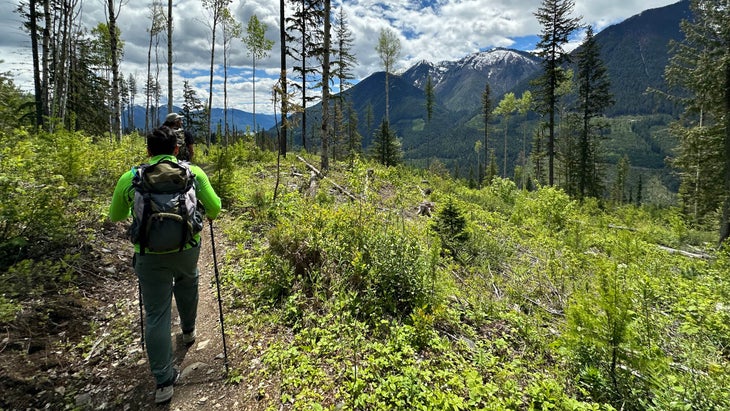
Hiking is Mountain Trek’s point of distinction, the programming pièce de resistance meant to set it apart from its peers. Each day for three to six hours, every participant heads to the same trail, split into four groups based on stamina and speed. Where Group 1 might hike 8 miles with 2,000 feet of gain, Group 4 might hike 6 miles with 500 feet of gain; the paths are arranged so that the squads occasionally overlap or intersect, a way to check in with and encourage one another. Misery loves camaraderie.
On long trails, I’d picked up a propensity for moving as quickly as possible, sometimes to the detriment of an easygoing conversation with a potential new friend or the chance to truly observe the wild places through which I was walking. Even in the fastest cadres, though, Mountain Trek prioritized intentional movement. They call it Flow Trekking, a term that makes me nauseous but whose goal I nevertheless get: to move at a pace that affords you exercise without injury and that allows you to be entertained by the sheer beauty of your surroundings or the life story of the person beside you.
I wondered if this would become tedious. Instead, I was stunned by how quickly I and everyone fell under the spell of simply walking at a clip that felt good. One other participant, an accountant who arrived in such a frazzled state that I actually wondered when she had last slept, grumbled incessantly after her first unseasonably hot day in the woods. On our last hike, however, I spotted her in the final hour, the sole member of Group 4, swinging her hiking poles and smiling at Group 1 like this was truly her favorite activity. It was as if this were the thing she had been born to do, only for merciless fate to force her to sit behind a desk.
At one point, a Boston dentist in my group for the day stood in front of a shaded boulder field, the rocks carpeted with moss. “It’s just so … green,” he said, pausing for a long time before he reached that adjective, as if so gobsmacked by nature he’d forgotten a word he’d probably known since he could walk. This wasn’t the Museum of Fine Arts; this was just an unremarkable patch of forest in British Columbia, and it seemed like it might break him apart with wonder.
I had spent so much of the last half-decade in nature that I took its transformative power for granted. Seeing a pristine patch of woods or a mountain’s intricate peak had lost at least some of its grandeur, but here it was again. Looking at moss on rocks was not new for me; looking at someone else look at moss on rocks and be stunned by it was new for me. It made me pause and appreciate that simple pleasure, as if a string had been tied to my finger with a note that read “Nothing lasts.”
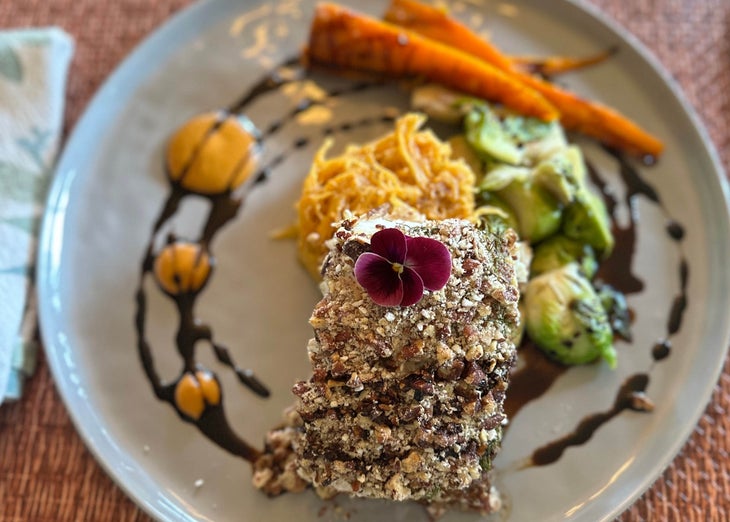
In many ways, the hikes were a lubricant for the more audacious lessons that came after them. In the afternoon, for instance, fitness classes taught the fundamentals of high-intensity interval training, of going until you could no longer go. Headier lectures about willpower and nutrition provided a preamble for fancy dinners meant to suggest a glamorous way of eating healthier at home by refocusing on nutrient categories and retrofitting meals to fill them. (Weight loss isn’t the explicit goal of Mountain Trek, so much as a potential symptom of reconsidering your entire lifestyle. Yes, I lost a few pounds of ice cream, but there was no America’s Biggest Loser-style shaming or celebration.)
Each night after an evening stroll, folks flitted among various massage rooms and assorted modes of therapy. In the course of a week, someone held vibrating tuning forks to my head, while a reiki practitioner let her hands hover above my face, as if the air between us were charged with magic. There was a craniosacral massage, a sound bath, a forest bathing session, more hours in a sauna and a hot tub and on the shores of Kootenay Lake than I can calculate.
I should say that I don’t know that I bought all of it. The massages were among the most powerful I’ve ever had, and one masseuse seemed to expunge knots that had been lingering in my muscles since the Appalachian Trail five years earlier. But some of the other disciplines left me wondering what I’d missed, if I’d simply not understood my mission or role in the room.
I was glad, though, to know that those therapies existed, and that it was all essentially people helping other people be something more. After all, some of my peers at Mountain Trek had certainly arrived not thinking that walking in the woods could change their life, something I have accepted as objective wisdom for years now. The least I could do, I realized, was open my mind to something that may have changed someone else’s life.
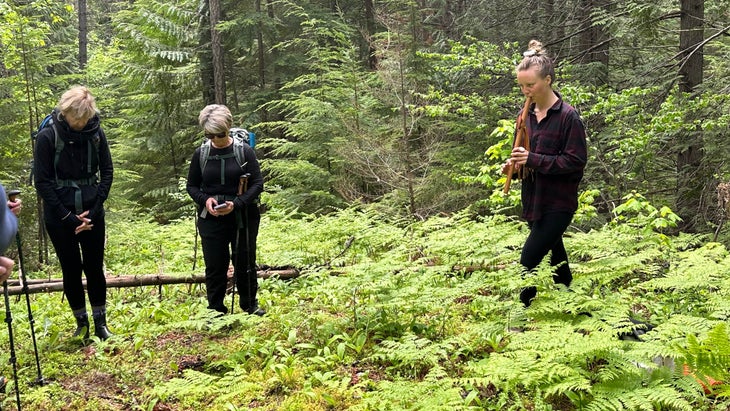
Coming home was hard.
When I left Mountain Trek, bound for the byzantine airport across the border in Spokane, I was lighter than I had possibly ever been—physically, yes, but also mentally. Every decision had been made for me, from when I woke up and went to bed to what I ate and where I would visit each day. A restlessly curious sort who is married to an absolute kindred spirit, I had not ceded control over my vacations that way since I was a child. It is not something I have ever craved, and yet, it felt incredible, a secret weight lifted.
But back in Colorado, everything was another frustration in waiting. That first night, I fought with Tina about where we’d eat dinner, because none of the options comported to my newfangled way of life. Driving across town to a speaking engagement the next day, I got so grumpy about traffic that she simply stopped talking to me for a while. I remained in such a funk that she didn’t bother with birthday gifts for several days, though my birthday had come and gone. I couldn’t argue with this decision; I was being an asshole, intent on arguing with everything but my own self-righteousness. They’d warned us about a comedown at Mountain Trek—how long would my fall last?
This feeling slowly faded, like the soreness of DOMS or the shock of learning something revelatory dimming. And as it did, I realized I had indeed come home with new ways of seeing, doing, and being. I slowly became more patient, more collected and calm, the occasional traffic Interstate 70 jam notwithstanding. The increasingly anxious news didn’t bother me quite so much. I learned to put my phone away and pick up a book, to talk to someone. The news would change, but it would also wait.
When we left Mountain Trek, we each picked three goals for the weeks to come, with instructions to focus on one. My goal had been to eat ice cream only three times a week, an insanely high number now that I’m writing it for the rest of the world to read. I eat it once every two weeks at most these days, and I start each morning with protein after repeated discussions about the biological mechanics of that at Mountain Trek. I continue to stretch, to strength train, to sit in silence, to treat my body and brain as more than a working or running machine. These were options before Mountain Trek that have now become the habits I indulge every day.
It’s funny, too: A few weeks before I shipped off to Mountain Trek, I went to Las Vegas to see Phish at Sphere. I have been a music obsessive since I was a preteen and a music journalist since I was 18, but they’re a band that I’d always dismissed. Still, I love an occasional spectacle, so I gave them a chance. I hated it.
A few weeks after I got home from Mountain Trek, I went to see Phish again for four days in a very hot field beside a NASCAR track in Delaware. I was going to write about them, and I expected to hate it doubly. It was, instead, one of the most revelatory experiences of my life. Cynicism finds what it wants, and openness finds what is there. I don’t think it was the reiki or craniosacral therapy working so much as a mind that had learned to jump to fewer conclusions, to judge only a bit more deliberately. I hadn’t needed ice cream to be happy, and I hadn’t known Phish could make me so happy. Sure, maybe I was just a 41-year-old white guy new to Colorado, succumbing to the inevitability of loving Phish. But I think my frame had shifted, becoming more flexible, the new crack letting in unexpected light.
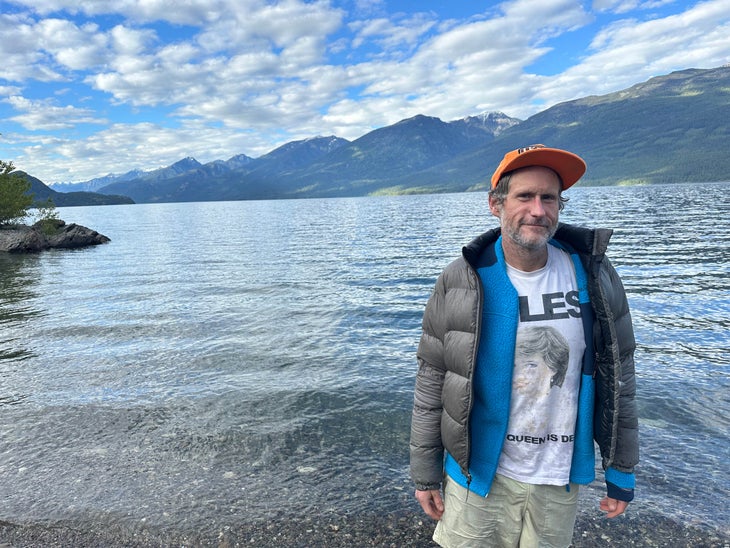
One thing, though, has continued to grate me about Mountain Trek, and it has nothing to do with the program: Why have we built a world where only the upper-class or comfortably middle-class have access to such a thing? If the white-collar workers of our world need this kind of help, then surely the relatively under-resourced people who work for them need it, too, likely more so. What a distinctly cruel paradox.
There will be those who dismiss any praise I have for Mountain Trek, because $7,000 is a massive amount of money for almost all of us. I can’t argue with them. Even if I think the experience was worth it—which I do, especially given the quality and thoughtfulness of the food, the staff, and the transportation—I know that many of us, myself included, cannot afford it. But we can’t afford it because we’ve built an opulent society where well-being is still, somehow, treated like a luxury, where health insurance is regarded as a gift, not a right or the responsibility we owe to one another. “Everyone deserves to feel healthy and alive,” Mountain Trek’s marketing materials read. “You are no different.” Actually, the differences are only becoming more pronounced.
In that context, Mountain Trek and every program like it can only be partially successful, because it is accessible to so very few. Yes, I am grateful to be one of those few, to have had the chance to have my life changed, for free, but I will forever be resentful that such a distinction must exist.
From 2025
